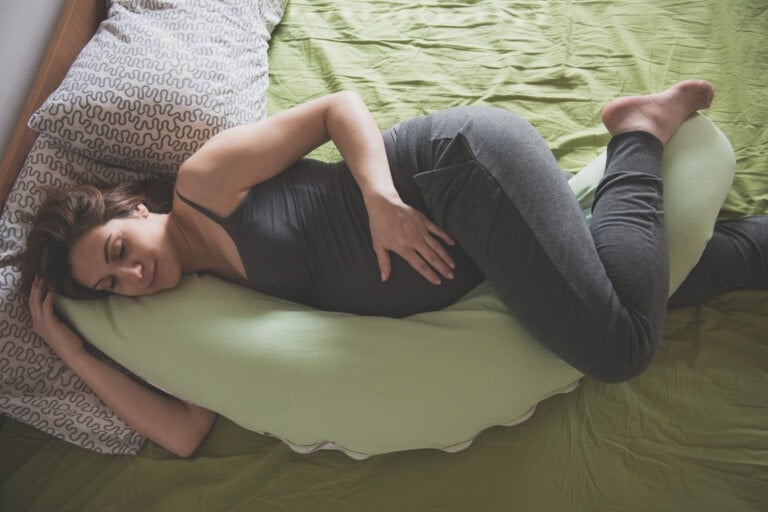Getting enough sleep while pregnant can be difficult. You know you will have difficulty getting enough sleep after the baby is born, so try to get as much rest as possible beforehand. The problem is that with all the changes your body is going through during pregnancy, it becomes difficult to sleep for various reasons.
During the first trimester, women tend to be sleepier as the placenta grows. In early pregnancy, the best thing you can do is follow your body’s lead and get as much sleep as possible. By the second trimester, the amount of sleep you need normalizes, but other things affect your sleep. For example, your growing belly will make you need to pee more often. The third trimester brings additional complications that lead to more disrupted sleep.1 This disrupted sleep makes you feel tired, and you may have difficulty getting enough quality rest.
In addition to needing to pee more often, you may also be awakened or have problems sleeping due to heartburn, restless legs syndrome, back pain, leg cramps, baby kicking and moving at night, congestion, being too warm, and weight gain. You could also be experiencing changing pregnancy hormones and anxiety about baby’s arrival.
10 Tips for Better Sleep During Pregnancy
There are some things that you can do to help yourself easier:
1. Drink a Lot of Water During the Day, but Slow down the Closer It Gets to Bedtime
Drinking a lot of water during pregnancy is important, but try to do it earlier in the day. Along with the belly comes the feeling of needing to pee more often. If you slow your water consumption as bedtime approaches, you will not need to get up as much during the night.
2. Watch What You Eat
Trying to sleep when you have heartburn is uncomfortable. To avoid heartburn, watch what you eat. Avoid large amounts of fried, spicy, and acidic foods. If you are experiencing nausea overnight, try eating bland snacks throughout the day to keep your stomach full.
3. Get Enough Exercise and Drink Enough Water
If leg cramps are an issue, improve circulation through regular exercise. Making sure to stay well-hydrated can also help in this area.
4. Sleep on Your Left Side
It is important to sleep on your left side while pregnant. This positioning allows for the best blood flow to the baby, uterus, and kidneys. However, lying flat on your back for long, especially after 20 weeks of pregnancy, is not a good idea. This is because when you lie on your back, your uterus compresses a major blood vessel called the vena cava. When that blood vessel is compressed, it disrupts the blood flow to your baby and can leave you feeling dizzy, nauseous, and short of breath.2
5. Get Some Pillows
Pillows can be helpful for a few different problems. If you do have heartburn or congestion, elevating your head can help. Specific pregnancy pillows can help you get comfortable as well. You could also use a pillow to cushion your knees to help you sleep. Even though I’m not pregnant, I still sleep with a pillow between my knees! It is still comfortable.
6. Practice Relaxation Techniques
Shutting off electronics for at least an hour before bed can help you calm down. If you experience anxiety during your pregnancy, consider other relaxation techniques such as prenatal yoga, a warm bath, a sound machine, soothing music, or massage. Journaling or discussing your fears regarding birth or becoming a parent can also help reduce your anxiety.
7. Take Naps Whenever You Can
Prioritizing rest and sleep while pregnant is essential, so if you can nap during the day, you should. Naps will help you get the additional rest that you need.
8. Cut down on Caffeine
If you are having trouble sleeping, caffeine may also contribute to the problem. You may want to cut down or cut out caffeine entirely and see if it helps. Avoid caffeine later in the day, and note that caffeine is also present in tea, soft drinks, chocolate, energy drinks, and certain medications, such as flu and cold remedies.
9. Ask for Help With Older Children
If you have older children, ask your partner to help if they wake up at night or if you need to take a nap. It is hard enough to get enough sleep while pregnant, and if you constantly wake up to attend to other children, you will lose even more sleep. So ask your partner for help with those wakeups, have him take them somewhere during the day so you can sneak in a nap, or have him get up with them in the morning so you can sleep later.
10. Talk to Your Doctor if You Have Concerns
If you have medical problems or persistent insomnia, talk to your doctor. They may have additional recommendations to help you get adequate sleep during pregnancy.
Pregnancy can be exhausting, so it is crucial to get enough rest. Make sure to take care of yourself and ask for help when you need it.


























